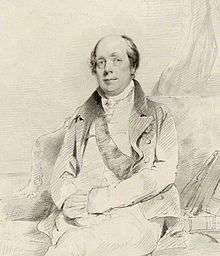Frederick North, 5th Earl of Guilford
| The Right Honourable The Earl of Guilford GCMG | |
|---|---|
 | |
| 1st Governor of British Ceylon | |
|
In office 12 October 1798 – 19 July 1805 | |
| Monarch | George III |
| Preceded by |
Robert Andrews (as Resident and Superintendent of British Ceylon) |
| Succeeded by | Thomas Maitland |
| Personal details | |
| Born | 7 February 1766 |
| Died | 14 October 1827 (aged 61) |
| Relations | Frederick North, 2nd Earl of Guilford (father) |
Frederick North, 5th Earl of Guilford GCMG (7 February 1766 – 14 October 1827), styled The Honourable Frederick North until 1817, was a British politician and colonial administrator.
North was a younger son of Prime Minister Frederick North, 2nd Earl of Guilford (usually referred to as Lord North). He was educated at Eton College (1775-82) and Christ Church, Oxford.
In 1791, he converted to the Eastern Orthodox Church and became an ardent adherent.[1] He represented Banbury in Parliament from 1792 to 1794 and served as first British Governor of Ceylon from 1798 to 1805. North proclaimed in 1801 that all rajakariya (royal service) was abolished and replaced it with a tax of one-fifth of their produce on low land and one-tenth on high land. North built his official residence, the Doric Bungalow, near the Mannar Sea according to his plan and he himself used to supervise pearl fishery which gained a substantial income in those days to the western. North declared himself head of the salagama caste and appointed Robert Arbuthnot head of the karava caste; the Judicial Charter limited the governor’s autocracy by establishing the Supreme Court and High Court of Appeal.[2]
In 1817 he succeeded his elder brother as fifth Earl of Guilford.
In 1824 North established the Ionian Academy on the island of Corfu, which was under British control as part of the United States of the Ionian Islands. It was the first University to be established in modern Greece. In this context, he financed the studies in France (at Ecole polytechnique ) of Giovanni Carandino, the founder of the modern Greek mathematics. The academy has now closed but a statue of the Earl stands on the island. A library and a street are also named after him.[3]
Lord Guilford died childless in October 1827, aged 61, and was succeeded in his titles by his cousin Francis.
Notes
- ↑ joh.cam.ac.uk
- ↑ san.beck.org
- ↑ Miller (1966), p. 123.
References
- Miller, W., The Ottoman Empire and its Successors: 1801–1927 (London, 1966), p. 123
- Kidd, Charles, Williamson, David (editors). Debrett's Peerage and Baronetage (1990 edition). New York: St Martin's Press, 1990.
- Leigh Rayment's Peerage Pages
External links
- Hansard 1803–2005: contributions in Parliament by the Earl of Guilford
| Parliament of Great Britain | ||
|---|---|---|
| Preceded by Lord North |
Member of Parliament for Banbury 1792–1794 |
Succeeded by William Holbech |
| Government offices | ||
| Preceded by New office |
Governor of Ceylon 1798–1805 |
Succeeded by Thomas Maitland |
| Peerage of Great Britain | ||
| Preceded by Francis North |
Earl of Guilford 1817–1827 |
Succeeded by Francis North |